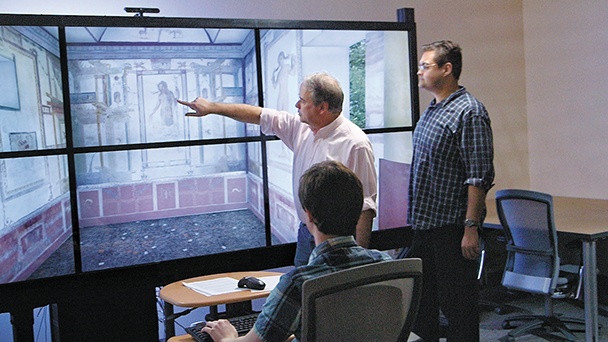UA Educational Game Design Center Awaits ADHE Approval
by December 21, 2015 12:00 am 182 views

A University of Arkansas educational, 3D video game design program is looking to expand its efforts throughout campus.
If approved by the Arkansas Department of Higher Education in January, the Tesseract Studio will become the Tesseract Center for Immersive Environments and Game Design, according to a UA press release.
While the center will now serve a variety of departments, especially in the Fay Jones School of Architecture, the Sam M. Walton College of Business, the College of Education and Health Professions and computer science in the College of Engineering, the program started in the classical studies department.
In 2011, associate professor David Fredrick came up with the idea of using role-playing games as a powerful, immersive way to teach students about, for example, Pompeii, the Roman Empire or Greek mythology.
Before long, design of the program became its own course. Students from a variety of colleges and majors were given hands-on experience in the development of 3D game content for educational use.
The content built within the course has often been later embedded into different UA academic courses.
Pending approval from the education department, the center will operate under the Office of Research and Economic Development and Fulbright College of Arts and Sciences.
It will provide a computer lab and infrastructure to support collaborative educational projects. The center also will foster entrepreneurship and economic development through the creation of intellectual property, as well as skillsets in 3D asset creation, interaction design and coding, and virtual reality content creation, according to the press release.
In October, the Tesseract Studio won two awards at the ninth-annual European Conference on Games Based Learning in Norway.
The UA Board of Trustees approved the creation of the center at its Nov. 20 meeting.
An advisory board of faculty and industry executives will be formed to provide strategic direction and guidance for the center.
Fredrick will lead the center and is also head of the humanities program at Fulbright College.
The UA Global Campus will provide $250,000 each year for the center’s first two years, while it is in the initial set-up phase. Global Campus will continue to support the center with $100,000 to $150,000 each year for at least five additional years. Other funding is expected from Fulbright College, grants and board memberships.
